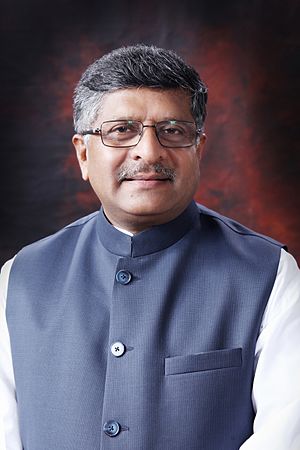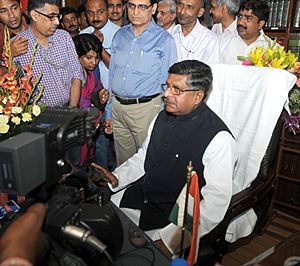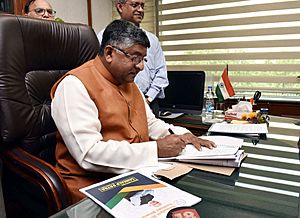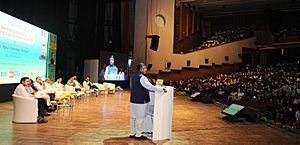Ravi Shankar Prasad facts for kids
Quick facts for kids
Ravi Shankar Prasad
|
|||||||||||||||||||||||||||||||||||||||||||||||||||||||||||||
|---|---|---|---|---|---|---|---|---|---|---|---|---|---|---|---|---|---|---|---|---|---|---|---|---|---|---|---|---|---|---|---|---|---|---|---|---|---|---|---|---|---|---|---|---|---|---|---|---|---|---|---|---|---|---|---|---|---|---|---|---|---|
 |
|||||||||||||||||||||||||||||||||||||||||||||||||||||||||||||
| Member of Parliament, Lok Sabha for Patna Sahib |
|||||||||||||||||||||||||||||||||||||||||||||||||||||||||||||
| Assumed office 23 May 2019 |
|||||||||||||||||||||||||||||||||||||||||||||||||||||||||||||
| Preceded by | Shatrughan Sinha | ||||||||||||||||||||||||||||||||||||||||||||||||||||||||||||
|
|||||||||||||||||||||||||||||||||||||||||||||||||||||||||||||
| Union Minister of State Government of India |
|||||||||||||||||||||||||||||||||||||||||||||||||||||||||||||
| 2002–2003 | Law and Justice | ||||||||||||||||||||||||||||||||||||||||||||||||||||||||||||
| 2001–2002 | Coal Mines |
||||||||||||||||||||||||||||||||||||||||||||||||||||||||||||
| Member of Parliament, Rajya Sabha for Bihar |
|||||||||||||||||||||||||||||||||||||||||||||||||||||||||||||
| In office 3 April 2000 – 30 May 2019 |
|||||||||||||||||||||||||||||||||||||||||||||||||||||||||||||
| Personal details | |||||||||||||||||||||||||||||||||||||||||||||||||||||||||||||
| Born | 30 August 1954 Patna, Bihar, India |
||||||||||||||||||||||||||||||||||||||||||||||||||||||||||||
| Political party | Bharatiya Janata Party | ||||||||||||||||||||||||||||||||||||||||||||||||||||||||||||
| Spouse | Maya Shankar | ||||||||||||||||||||||||||||||||||||||||||||||||||||||||||||
| Children | 2 | ||||||||||||||||||||||||||||||||||||||||||||||||||||||||||||
| Alma mater | Patna University (BA, MA, LLB) | ||||||||||||||||||||||||||||||||||||||||||||||||||||||||||||
| Profession | Lawyer | ||||||||||||||||||||||||||||||||||||||||||||||||||||||||||||
|
As of 26 June 2024
Source: [1] |
|||||||||||||||||||||||||||||||||||||||||||||||||||||||||||||
Ravi Shankar Prasad (born 30 August 1954) is an Indian politician and a Lawyer. He is a member of the Bharatiya Janata Party (BJP). He has been a Member of Parliament (MP) since 2000. He first served in the Rajya Sabha (the upper house of India's Parliament) from 2000 to 2019. Since 2019, he has been an MP in the Lok Sabha (the lower house).
Mr. Prasad has held several important roles as a Union Minister in the Indian government. He worked on modernizing laws and bringing digital services to people. He also helped with legal discussions about important government purchases.
Early Life and Education
Ravi Shankar Prasad was born in Patna, Bihar, India. His family was religious. His father, Thakur Prasad, was a well-known lawyer at the Patna High Court. His father was also one of the people who helped start the Jan Sangh, which later became the Bharatiya Janata Party.
Mr. Prasad studied at Patna University. He earned degrees in Arts and Law. He joined a student group called the Akhil Bharatiya Vidyarthi Parishad in 1969. He took part in student movements in Bihar. He was even put in jail during a time called the Emergency.
Law Career
Ravi Shankar Prasad started working as a lawyer in 1980. He practiced at the Patna High Court. In 1999, he became a Senior Advocate at the Patna High Court. He also became a Senior Advocate at the Supreme Court of India in 2000.
He was involved in several important legal cases. He represented the Hindu Mahasabha in the Ayodhya dispute. He also defended Lal Krishna Advani in court. Mr. Prasad was also the main lawyer in a public interest case against former Bihar Chief Minister Lalu Prasad Yadav. This case was about the Fodder Scam.
Political Journey
Ravi Shankar Prasad began his political journey as a student leader. This was in the 1970s. He helped organize protests against the government at that time.
Joining the Bharatiya Janata Party
Mr. Prasad has always been loyal to the Bharatiya Janata Party (BJP). From 1991 to 1995, he was the National Vice President of the Bharatiya Janata Yuva Morcha. This is the youth group of the BJP. In 1995, he became a member of the BJP's National Executive Committee.
First Ministerial Roles (2000-2004)
In April 2000, Mr. Prasad was elected to the Rajya Sabha for the first time. This is the upper house of the Indian Parliament.
Under Prime Minister Atal Bihari Vajpayee, he served as a Minister of State. He worked in the ministries of Coal (2001–2003). Here, he helped speed up reforms in coal and mining. He also worked in Law and Justice (2002–2003). From 2003 to 2004, he was Minister of Information and Broadcasting. In this role, he made changes in radio, television, and animation. These changes helped improve their quality.
Years in Opposition
In March 2006, Mr. Prasad became a national spokesperson for the BJP. He was later promoted to Chief National Spokesperson in 2007. In 2010, he became the party's general secretary.
He was re-elected to the Rajya Sabha two more times. Once in April 2006 and again in April 2012. As an MP, he was part of different parliamentary committees.
Under Narendra Modi's Leadership
The BJP-led National Democratic Alliance won the 2014 general election. After this, Mr. Prasad became part of the Narendra Modi Cabinet. On 27 May 2014, he was appointed as Minister of Law and Justice. He also became Minister for Communications and Information Technology.
He served as Law Minister for more than five years in total. He was also Minister of Communications and IT. This ministry was later divided into two parts in 2016. He then took charge of the Ministry of Electronics and Information Technology. He held this role until July 2021. During his later term, he also held the Communications portfolio.
Changes in Judge Appointments
When Mr. Prasad became Law Minister in 2014, he worked on a new law. This law was for the National Judicial Appointments Commission. It aimed to change how judges are chosen. The goal was to make the process clearer. Parliament passed this law. However, in 2015, the Supreme Court of India said the law was not valid. They felt it might affect how independent judges are.
Law on Triple Talaq
In 2017, the Supreme Court said that the practice of instant divorce by saying "talaq" three times was unfair. This practice was called triple talaq. The court said it went against women's rights. After this, the government introduced a bill. This bill aimed to make triple talaq illegal. Law Minister Prasad supported this bill. It was passed by Parliament in 2019. This made it a law that protects Muslim women's rights in marriage.
Digital India Program
As Minister for Electronics and Information Technology, Mr. Prasad led the Digital India program. This program aims to make India more digitally connected. He often talked about the common service center scheme. This scheme provides digital services and creates jobs. He also highlighted the growth of business processing units (BPOs) in different areas. The increase in electronic manufacturing units in India was also a success.
In 2018, a UK-based group named him one of the top twenty leaders. This was for his work in digital government. His role in Digital India and support for net neutrality were recognized.
Supporting Start-ups
Mr. Prasad also played a key role in helping India's start-up businesses. He organized meetings to understand what start-ups needed. He helped shape government policies to support new businesses in the country.
Discussions with Social Media Companies
Mr. Prasad has supported the idea of net neutrality. This means that all internet content should be treated equally. In 2016, he did not allow Facebook's Free Basics platform in India. He said it only gave access to some websites, not the whole internet.
In 2021, new rules were made for social media companies. These rules aimed to regulate social media and stop misuse. Mr. Prasad and his Ministry had discussions with big tech companies like Twitter. These discussions were about following the new local laws.
In the Lok Sabha 2024 elections, Ravi Shankar Prasad won in the Patna Sahib Lok Sabha constituency. He defeated Dr. Anshul Avijit.
Personal Life
On 3 February 1982, Ravi Shankar Prasad married Maya Shankar. She is a historian and a professor at Patna University.
See Also
- List of politicians from Bihar
 | Janet Taylor Pickett |
 | Synthia Saint James |
 | Howardena Pindell |
 | Faith Ringgold |




